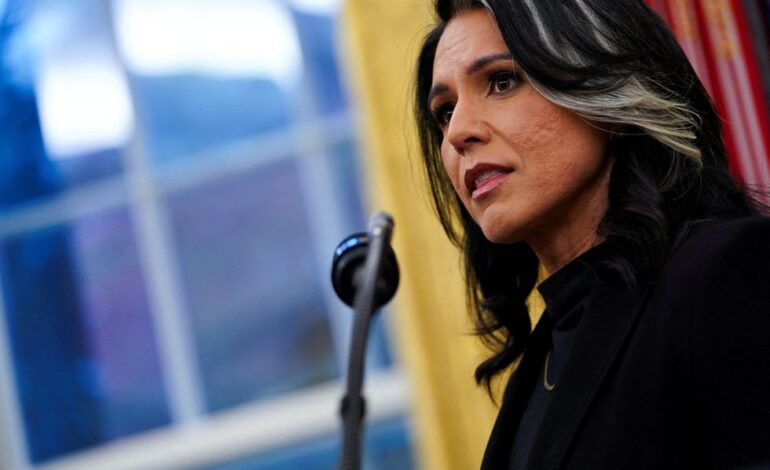Trump and Gabbard’s Posts Ignite Far-Right Violence Against Obama

On July 18, 2023, Tulsi Gabbard, the former Director of National Intelligence, made a controversial post on Twitter accusing former President Barack Obama and other high-ranking officials in his administration of engaging in a “years-long coup” and a “treasonous conspiracy” against Donald Trump. This incendiary statement quickly garnered significant attention, amassing over 13 million views in just a few days. The resulting fallout saw extremist groups online using her claims to justify violent fantasies against political opponents, particularly targeting Obama.
In response to Gabbard’s allegations, Donald Trump shared an AI-generated video on his platform, Truth Social, depicting Obama’s arrest. This action further inflamed the situation, with Trump’s followers echoing calls for violence against Obama. Major news stories often serve as catalysts for extremist rhetoric, and this case proved to be no exception. The online discourse escalated, prompting users on various platforms to fantasize about violent retribution against the former president.
Research conducted by the Global Project Against Hate and Extremism (GPAHE) revealed alarming trends in online hate speech following Gabbard and Trump’s posts. Between July 17 and July 20, discussions on Truth Social that labeled Obama as treasonous surged, with comments advocating for imprisonment or execution reaching a peak of 56 comments on July 19. This marked a staggering increase of 1,767% in hostile rhetoric targeting Obama.
Supporters of Trump reacted vehemently to Gabbard’s assertions, calling for a military tribunal against Obama. Posts on Truth Social included demands for Attorney General Pam Bondi to take immediate action, with one user stating, “The punishment for Treason is Hanging,” while another suggested that Obama and his former cabinet should be “put up against a wall for a firing squad.” Comments on Gab, another platform popular among far-right users, reflected similar sentiments. Between July 17 and July 20, comments advocating for violence against Obama rose from nine to 48, representing a 433% increase.
The discussions often took a deeply disturbing turn, with users making grotesque references to America’s history of lynching. Such comments included suggestions for Obama to be publicly executed or even lynched, accompanied by remarks that displayed a willingness to take justice into their own hands. Posts echoed sentiments of frustration with the political system, labeling Obama a “Radical Islamic Terrorist Sympathizer” and demanding extreme consequences for perceived treason.
On Telegram, a platform known for hosting extremist views, a small but concerning rise in similar rhetoric was noted, with comments targeting Obama increasing from zero to twelve during the same timeframe. A manual review by GPAHE of private Telegram groups revealed even more instances of violent and conspiratorial language. Users in these groups expressed excitement over the potential for Obama to be convicted of treason, envisioning a future where he could face the death penalty.
The broader implications of this rhetoric are troubling. Trump has repeatedly threatened his political adversaries with persecution, a trend that began during his initial campaign against Hillary Clinton. His continued targeting of judicial figures and political opponents has contributed to an environment where threats against public officials have become more common.
The escalation of violent rhetoric online underscores a growing normalization of political violence, which is already on the rise. Following the tragic assassination of Minnesota House Speaker Melissa Hortman, the urgency of addressing this issue has become more pronounced. The research conducted by GPAHE consistently shows spikes in online hate and violence whenever prominent political figures make inflammatory statements.
As a nation, the challenge lies in confronting the normalization of such dangerous discourse. The combination of Gabbard’s and Trump’s incendiary posts not only emboldened extremists but also perpetuated a cycle of hate and violence that threatens democratic values. Wendy Via and Heidi Beirich, co-founders of GPAHE, emphasize that silence in the face of such rhetoric only contributes to its acceptance.
The situation calls for vigilant public discourse and accountability, as we navigate the complex landscape of political expression in the digital age.






